Head trauma is a minor concussion, the most common condition in neurology. The pathological condition develops after TBI, is associated with vascular disorders and is the simplest form of contusion. A patient can get a concussion during sports, at home, at work and when falling.
Concussion is a mild form of damage to the "gray matter"; in terms of frequency, it occupies a dominant place in the structure of TBI. The main condition that must be observed during treatment is sleep and rest. But the disease can be easily confused with severe brain injury, requiring immediate hospitalization, drug therapy in a hospital setting.
The main signs of a mild form of contusion:
- Throbbing spasms, constant noise, dizziness.
- Great pallor of the skin.
- Doubling before the eyes, when it is difficult to concentrate on one object, a dense veil.
- Feeling nauseous, but vomiting may not be present.
- Weakness, malaise, wandering pulse, pressure drops, poor appetite.
The main symptom in mild trauma and concussion is short-term memory loss, loss of orientation in space.
In the case of an ordinary injury, the "gray matter" does not receive visible damage, the study does not give grounds to establish it. Diagnosis is most often carried out by indirect symptoms.
The fundamental signs of the disease:
- slowness of thinking;
- emotionality instability;
- violation of speech functions.
With an uncomplicated form of TBI, home therapy is acceptable, but you should first consult with your doctor who will tell you what to do in this or that case. It all depends on the neurological symptoms of the disease. In some situations, additional examination by a neurosurgeon, ophthalmologist is required.
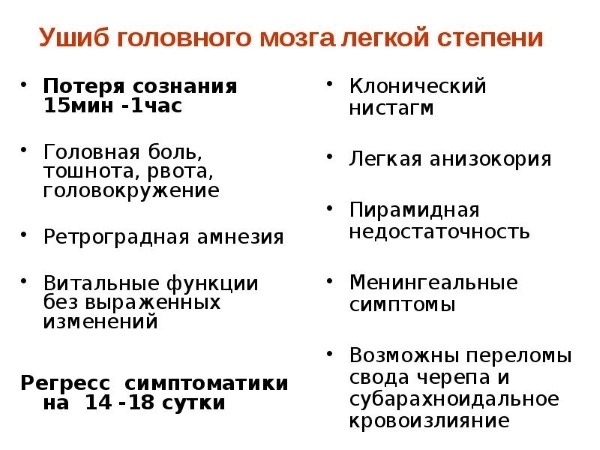
Signs of Common Trauma in Newborns
Mild concussion and bruises of the brain have their own symptoms in children due to the characteristics of their body. Doctors sometimes find it difficult to diagnose the presence of pathology. At the first suspicion of TBI, you should immediately visit a neurologist.
Concussion is not a common occurrence in infants, but, despite this, it manifests itself in the following symptoms:
- Constant regurgitation after feeding, refusal to eat.
- Vomiting, increased anxiety, or vice versa, drowsiness and lethargy.
- Poor sleep, muscle twitching in the arms, legs.
- Pale skin or red spots.
Signs of trauma in an infant can make themselves felt the next day after TBI, this usually happens when the baby rolls over and there is a risk of falling from a hill. He may get hit and start crying after 2-3 minutes, as he has lost his sense of reality for a while.
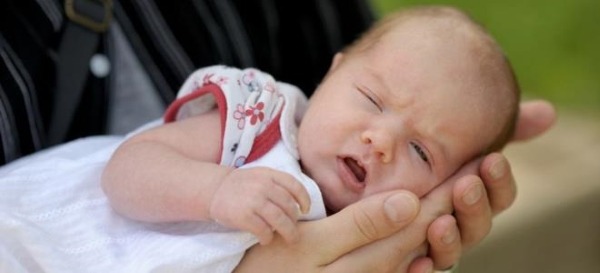
Manifestation of trauma in infants
Methods for diagnosing minor trauma
An accurate diagnosis can only be made by a neurologist or traumatologist after examination. Based on eyewitness accounts and symptoms of the disease, the doctor will decide on hospitalization and treatment. Diagnostics can be carried out using:
- electroencephalography;
- radiography;
- MRI and CT;
- dopplerography (ultrasound);
- echoencephalography.
If the patient can talk, special testing is carried out with him, with the help of which his reaction to what is happening is established. Also, the doctor carries out hardware research, palpation of the problem area, determines the possible localization and degree of damage to the locomotor system.
Under the supervision of a doctor, the patient should be in a hospital for 2 to 14 days. In order to control the clinical picture of the course of pathology. Children stay in the hospital under the supervision of medical staff or parents.
Complex therapy of a pathological condition
As with any traumatic brain injury, concussion should be treated under the supervision of a qualified neurologist, surgeon, or traumatologist. If your doctor detects cerebral edema or bleeding, you may need surgery or other emergency procedures.
In normal cases, with a brain injury, treatment is carried out independently:
- Cold lotions. It is best to apply them as quickly as possible to the injured area after a fall to reduce swelling. The procedure is repeated every 2-3 hours.
- If you have a headache, you should drink paracetamol tablets. You can not take anti-inflammatory nonsteroidal medicines - "Aspirin", the drug "Ibuprofen". They can cause bleeding.
- Full rest, eliminate stressful situations.
- Do not take drugs, alcoholic beverages.
- You can start studying and work only after complete recovery (this also applies to driving a car).
- Exclude contact sports for several weeks after TBI.
In the presence of more dangerous symptoms, treatment is carried out in a hospital setting in a special neurosurgical department. In the absence of complications, the duration of therapy is 7 days, after which the patient is transferred to outpatient observation.
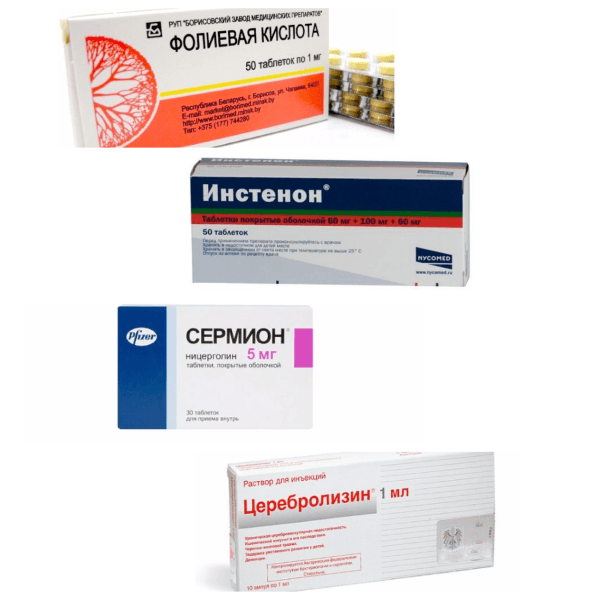
Medication is an integral part of therapy
The main place in the treatment of a pathological condition is taken by taking medications. Such treatment is aimed at eliminating the main signs of a concussion. The patient is prescribed the following medications:
- biostimulating: the drug "Methionine", "Alvezin", "Cerebrolysin";
- drugs that restore blood circulation in the brain: "Instenon", "Cinnarizin", tablets "Nicotinate", "Xanthinol";
- drugs that enhance the metabolic process: "Pyriditol", "Pantogam", "Sermion", the drug "Piracetam";
- amino acids and useful substances: ascorbic acid, folic acid, B, retinol and tocopherol, aloe extract;
- herbal remedies: St. John's wort, ginger root ginseng, eleutherococcus, succession, cinquefoil. They have anti-inflammatory, sedative and analgesic effects;
- mild pathology is treated with the following drugs: "Pentalgin", "Analgin", "Sedalgin", "Maksigan";
- sedatives for concussion: "Corvalol", "Valerian", "Motherwort", "Valoserdin";
- nootropic and vascular drugs: "Cavinton", the drug "Nootropil", "Stugeron", tablets "Sermion", "Aminalon". They help you recover faster from injury;
- in case of a concussion, tranquilizers are prescribed: "Rudotel", "Fenazepam", "Elenium", "Nozepam";
- medicines for dizziness: Tanakan, Belloid, Papaverine;
- anti-sclerotic drugs are prescribed for elderly patients;
- tonic, multivitamin complexes;
- in case of asthenic pathologies, it is recommended to use "Pantogam";
Together with drug therapy for cerebral contusion, physiotherapy and other traditional medicine are used. After the concussion, the patient returns to his old way of life under the supervision of a doctor.
WHAT DO THE DOCTOR'S SAY?
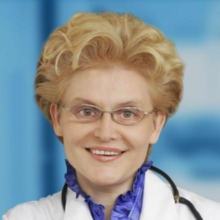
“According to my experience and observation, I can conclude that the majority of both men and women suffer from headaches. And this problem only gets worse with age.
Some seek help from doctors, others use self-medication, and others do not react to pain in any way.
Whichever option you choose, I would recommend one very effective drug, Hendrix. It successfully relieves headaches and migraines.
It includes ... "
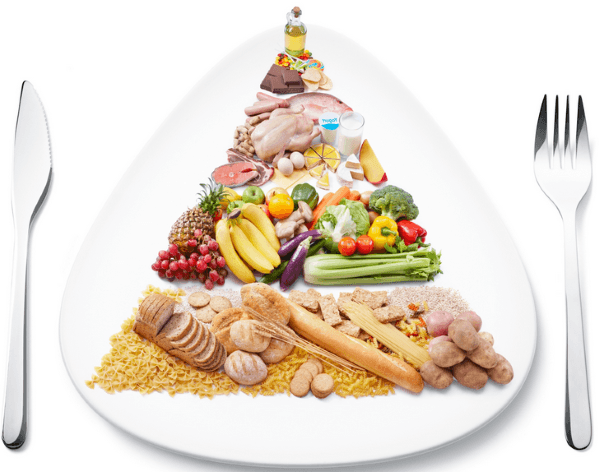
A balanced diet is a major step to recovery
During treatment, the patient should give preference to a balanced diet. In case of concussion, it is recommended to exclude potent blood pressure stimulants - alcohol, sweet products, caffeinated drinks.
With adequate therapy, after 2-3 days, the patient will experience significant improvements after the concussion, and after a week, the condition will recover completely. If this is not observed, you should seek help from a doctor.
If a mild concussion of the brain is accompanied by bleeding from the ears, nose, it is necessary to urgently call the ambulance team. At the end of therapy for 2-3 weeks, it is recommended to exclude sports, long walks.
Consequences and rehabilitation after TBI
Some signs of mild trauma can persist for a long time if the patient is not properly treated. Most patients note that they are tormented by constant migraine attacks, especially with changing climate conditions or hypertension.
At first glance, a concussion may seem like a completely harmless pathology, but it very often causes many problems in the future. The main consequences of TBI:
- Impaired consciousness.
- Systematic dizziness.
- Feeling nauseous.
- Longer-lasting headaches.
- Hallucinations.
- Intolerance to light.
- Poor memory, irritability.
- Epileptic seizures.
- Decrease in the acuity of smell, vision.
The consequences of trauma in children who have suffered trauma at an early age can be felt at school, during increased physical and mental stress.
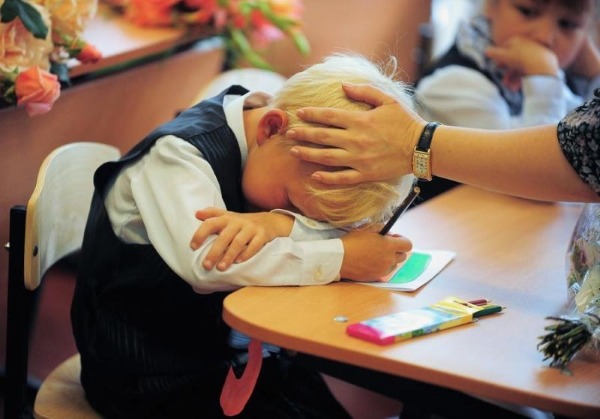
Schoolchildren can pay the price for early childhood head injuries
Treatment of mild concussion is carried out under the supervision of a doctor in a hospital or at home. During rehabilitation, the patient must adhere to all the recommendations of a neurologist, surgeon or therapist. Self-medication is the main reason for the development of serious diseases that require long-term therapy.
Concussion recovery activities include:
- physiotherapy;
- massage, reflexology;
- taking medications according to indications;
- herbal teas, multivitamin complexes.
For 2 months, the patient should avoid heavy physical, mental stress. For a complete recovery, it is better to undergo sanatorium treatment, it will allow the whole body to recover more effectively.
After a blow, a fall, at the first sign of a concussion, it is best to consult a doctor and undergo a comprehensive examination. If the injury is severe, treatment must be carried out in a hospital with the use of serious medications and other methods of exposure. According to the indications, the doctor will prescribe a surgical intervention to exclude the development of serious complications.

